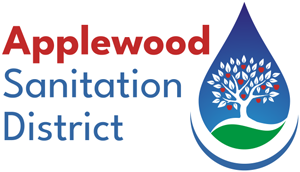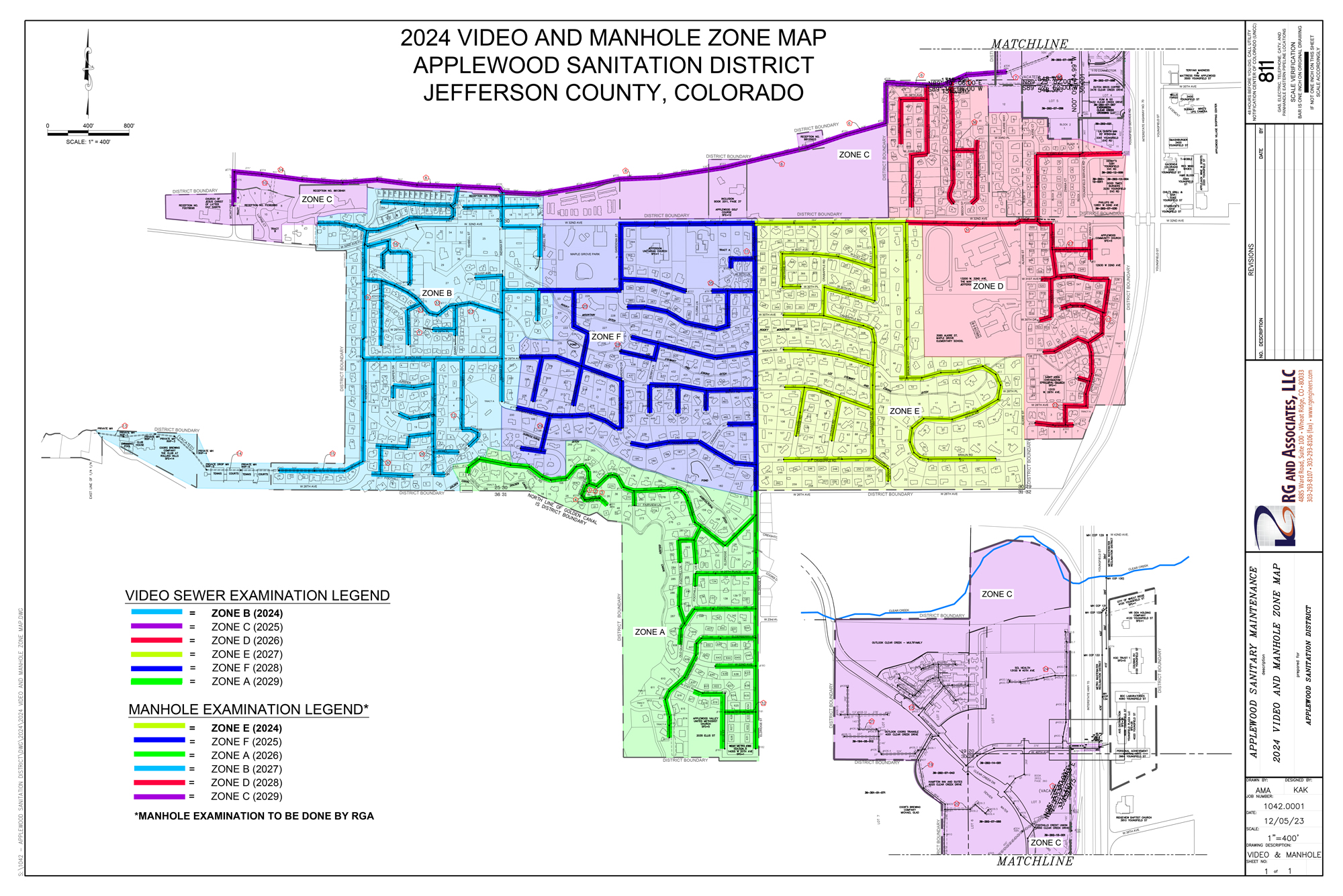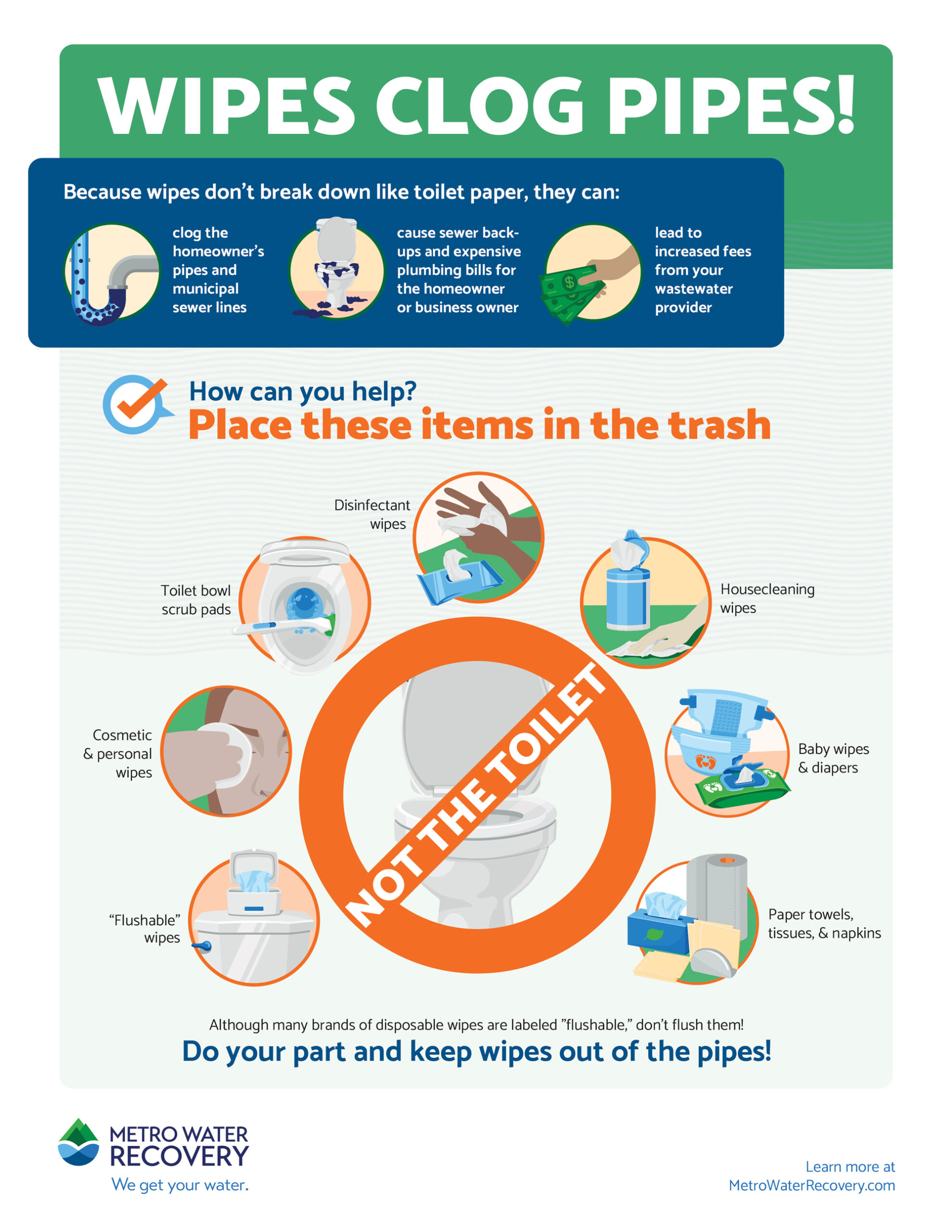
FAQ
GENERAL INFORMATION
The Applewood Sanitation District was organized in 1958 and approved by the District Court of Jefferson County, under what is now known as the Special District Act.
The District provides sanitary sewer service to both residential and commercial properties. The sewer system is a network of sewer lines, manholes, and other structures used to collect wastewater and transport it to a treatment plant.
The District is generally located west of I-70, between Youngfield Street (east side) and McIntyre Street (west side), and between Highway 58 (north side) and West 20th Avenue (south side). The District covers approximately 778 acres in Jefferson County (see map for specific boundaries).
No. The District system is a collection system only. The District’s wastewater is transported to the Metro Wastewater Reclamation District system for treatment.
The District is governed by a five-member elected Board of Directors. The Board sets policy, fees and charges, and governs the District on behalf of the community. The Board demands a high standard of wastewater collection. The Board is tasked with governance and has the authority to manage, control, and supervise all business affairs of the District, including strategic planning for the future.
UNDERSTANDING YOUR BILL
Residential and multi-family properties are billed a flat-rate quarterly sewer fee per Single-Family Residential Equivalent (SFRE). Additional dwelling units (ADU) are billed a flat-rate quarterly sewer charge, which is equivalent to 66.67% of the annual residential sewer fee. Multi-family properties are billed the quarterly flat-rate residential sewer fee for each unit within the building.
Commercial customers are billed a flat rate for sewer service plus actual monthly water usage. Commercial customers are billed monthly.
Please review our Billing page for detailed information about due dates and late fees.
We strongly recommend that you pay online with Nexbillpay.
For other payment methods, please visit our Billing page for details.
No, the sewer bill must stay in the owner’s name.
SEWER LINE MAINTENANCE AND BACKUPS
It’s important to know that including all plumbing throughout the home and the sewer (wastewater) line extending from the property owner’s home to the District’s main line, including the actual tap connection to the District’s main line, is owned and maintained by the property owner. It’s at the point of connection (usually under the street) where the home pipeline connects to the wastewater main pipeline that the District takes over the responsibility for maintaining the wastewater pipeline. That is why it’s so important to NEVER put any oils, fats, or grease down the drain or flush anything but human waste and toilet paper down the toilet.
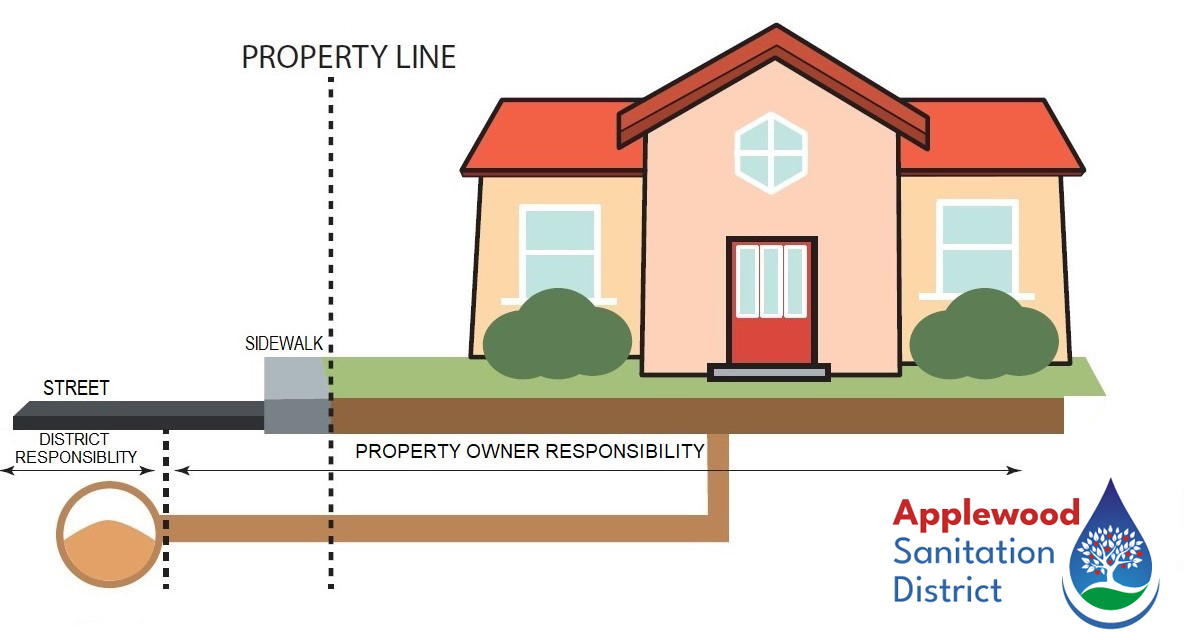
Under the District’s current maintenance program, approximately one-third (1/3) of the system is cleaned each year. The District uses high pressure water cleaning, tree root growth removal, and other methods to ensure that our lines are clear of debris to keep the system running smoothly. In addition, the District conducts video sewer inspection of one-third (1/3) of the system every other year (in other words, the entire system is surveilled every six years).
When a sewer backup or other problem occurs, in most cases it will not be obvious whether the problem area is in the property owner’s sewer or the public main line.
First, check to see if your neighbors are backing up too. If not, the blockage is most likely in your sewer line. If you believe there is a blockage in the public main line, contact the Applewood Sanitation District at (303) 232-6883 during regular business hours or (303) 475-5493 after hours.

Download the Cover Your Flush brochure here to learn more about sewer backups.
The District will come out to inspect the public main line free of charge. If a problem is found within the public main line, it will be repaired as soon as possible. If the public main line is found to be clear, the property owner will be informed that the blockage is probably in the sewer line. In this case, the property owner is responsible for maintenance or repair.
If a backup occurs in your home due to a blockage in the property owner’s sewer line or lateral, it is their responsibility to clean up any damage from the backup. That’s why it is so important to let everyone in your home know what not to flush and put down the drain. In the event of a blockage in the District’s main line that results in a backup into private property, the District may be responsible for the cleanup but only if the District was negligent in causing the backup to occur.
The District always urges our customers to obtain insurance coverage for sewer backups. Please check your policy or call your agent to be sure you are covered should a mishap occur. Not all homeowners’ insurance policies will cover costs incurred with sewer backing up in their home.
Most sewer backups occur because the line is plugged with grease or roots or a combination of grease and roots. Backups are also caused by a sag (or belly) in the property owner’s sewer line that has collapsed. Never place anything in the system other than toilet tissue. Products like baby wipes and rags and other products labeled “flushable” frequently cause backups because they do not disperse like bathroom tissue.
FOG refers specifically to Fats, Oils and Grease entering the sewer system. When you put cooking waste like grease, oil and food scraps down the drain they are usually warm and free flowing. However, shortly thereafter, they cool and harden and adhere to the pipe wall. A FOG buildup will eventually cause a backup.
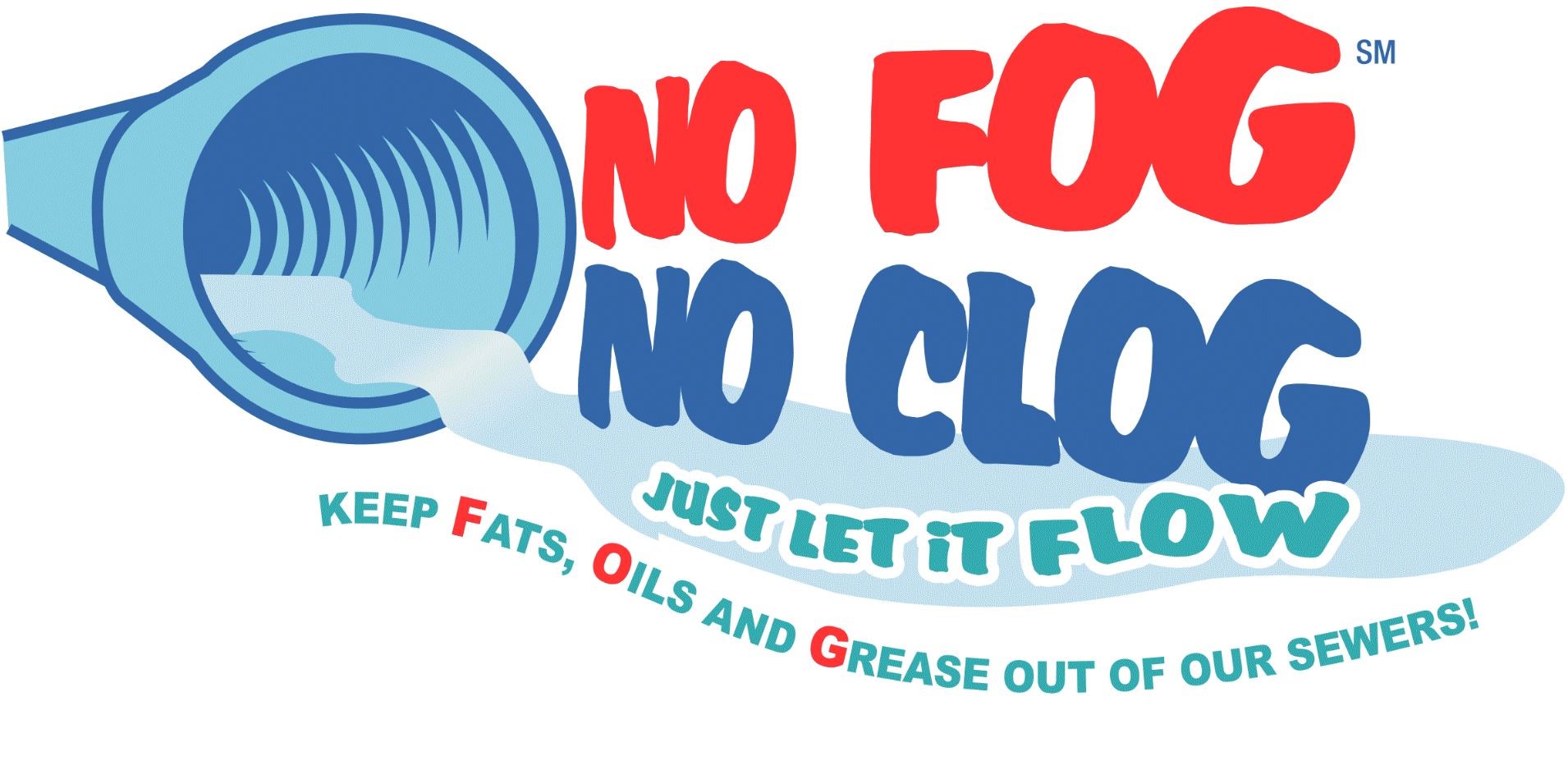
WASTEWATER, INFRASTRUCTURE & EASEMENTS
Wastewater or sewage is the byproduct of many uses of water such as showering, dishwashing, laundry and flushing the toilet. After the water has been used, it enters the household’s wastewater line and after it connects to the District’s main wastewater line, the wastewater flows to a wastewater treatment plant.
Learn more about sanitary sewer systems here.
Pollutants must be removed from the wastewater to help protect the environment and public health. When water is used in our community, the water becomes contaminated with human waste. If left untreated, these pollutants would negatively affect our health, water quality and environment.
Sanitary sewer systems are the public sewer main lines and manholes that collect and transport wastewater.
The manhole’s circular metal lid, usually located in the middle (sometimes to the side) of the street, is for access to the public main line. Only authorized District personnel can remove the manhole cover and enter the manhole. Typically, these lids are sealed shut so that odors are not released and so that water filtration and debris entering the system is prevented.
Please report the occurrence to the District immediately at (303) 232-6883 during regular business hours or call the Emergency Number at (303) 475-5493 if after hours.
When a public sewer line crosses private property, the property owner grants the Applewood Sanitation District an easement, which is an interest in the property that enables the District to operate and maintain the sewer line and related facilities within the easement area. The District is usually granted a 30-foot-wide easement over the length of the sewer pipe line and related facilities.
The property owner continues to own the land and has only given up limited rights with respect to the portion of land used for the easement. Maintenance of the property within the easement is the responsibility of the property owner. The property owner continues to use the surface of the land as long as such use does not interfere with the District’s operations, maintenance, and repair of its facilities. The property owner’s use, however, usually does not entail the right to build a structure within the easement area.
The District may access its easements at any time. The District may, on occasion, authorize and have a Contractor perform specific tasks on the public main line inside an easement.
Easements are typically granted to the District with the understanding that the property owner may make improvements to the surface such as fences, asphalt paving, irrigation and lighting systems or similar improvements. However, if these improvements are required to be removed to maintain the underlying public main line, replacement is at the cost of the landowner. Structures are never allowed inside an easement.
An encroachment is an unauthorized physical intrusion into the limits of the easement area. The District may require that any unauthorized encroachments be removed at the property owner’s expense.
The property owner may be faced with the costs of removal and any associated damages resulting from unauthorized structures or improvements on land subject to an easement.
OTHER
Call 811 or visit Colorado811.org at least 3 business days before you dig. It is Colorado law that all who wish to dig must first give utilities up to three business days to locate any facilities (gas and electric, communications, and cable) which may be impacted by excavation. 811 sends a message to all utilities which service your property. Once your lines are marked, you will know their approximate location and you can dig safely. Knowing what’ s below will protect you, your family and your neighbors. So please remember, Call 811 Before You Dig!
Never put hazardous household chemicals down the drain, toilet, or into the trash. Residents of Jefferson County can dispose of hazardous materials at Rooney Road Recycling Center at 151 South Rooney Road, Golden, CO near the intersection of I-70, C-470 and West Colfax. The Center is open on Wednesdays and Saturdays from 8:00 a.m. to 2:00 p.m., by appointment. Book your appointment online.
For more information, visit the Rooney Road Recycling Center website.
No. Connecting sump pumps to the sanitary sewer is illegal.
